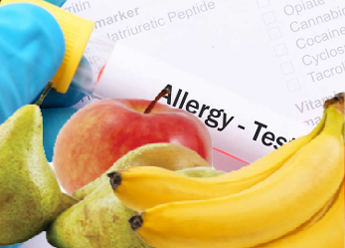Fruit Allergies: Overview and Types
A wide variety of fruits have been linked to allergic reactions, but the most common and well-documented triggers include mango, kiwi, apple, and peach. People with pollen or latex allergies often experience allergic symptoms when consuming certain fruits.
While fruit allergy symptoms are usually mild and short-lived, severe reactions such as anaphylaxis can occur and require urgent medical attention.

Types of Fruit Allergic Reactions
Fruit allergies typically arise from an immune reaction to specific proteins (allergens) in the fruit. Many affected individuals are sensitized to components like fruit pollen or latex and may react to multiple fruits such as apple, cherries, peach, papaya, mango, kiwi, etc,.
1 Pollen-Food Allergy Syndrome (PFAS) / Oral Allergy Syndrome (OAS):
Also known as Birch-fruit syndrome, it is caused by cross-reactivity between pollen allergens and proteins in certain fruits in the Rosaceae family such as apple, apricot, plum, and cherry.
Symptoms affect the mouth and throat (itching, swelling of lips, tongue, and throat) and usually appear within 10 minutes of eating the fruit.
Most cases are mild and self-limiting, but systemic symptoms such as hives, wheezing, or—rarely—anaphylaxis can occur.
2 Latex-Fruit Syndrome
Triggered by cross-reaction between latex (rubber) proteins and proteins in certain fruits.
About 30–50% of latex-allergic individuals also react to plant-derived foods, especially fresh fruits like banana, avocado, papaya, passion fruit, fig, melon, mango, kiwi, pineapple, peach, and tomato.
Symptoms may include generalized hives, abdominal pain, vomiting, and, in severe cases, life-threatening reactions.
Low-Allergy Fruit Options
Fruits such as apples, apricots, bananas, dates, and pears are generally better tolerated. Mangoes, papayas, and peaches may also be lower on the allergy scale for many people. However, individual sensitivities vary, so new fruits should be introduced gradually while monitoring for symptoms.
Beyond fresh fruit
Allergic reactions can also occur after eating processed fruit products such as juices, jams, jellies, preserves, or even baked goods containing fruit. Processing does not always remove allergenic proteins, so symptoms may still occur.
To reduce risk, it’s important to read food labels carefully and check for hidden fruit ingredients before consumption.
Management and Prevention
Anyone suspected of having a fruit allergy should avoid fresh fruit and fruit-based products until medically evaluated.
If an IgE-mediated fruit allergy is confirmed, strict lifelong avoidance is recommended.
People with latex, avocado, chestnut, kiwi, melon, or certain pollen allergies should be screened for fruit reactions before regular consumption.
If tolerance is uncertain, avoid the fruit until proper testing confirms safety.
Read further on:
≺≺ What food is most effective for moderating blood sugar?
≺≺ How Do Sugary Meals and Beverages Harm Dental Health?
≺≺ How are artificial sweeteners made?
≺≺ What health problems are linked to consuming corn syrup?
≺≺ What are the four enemies of blood sugar?
≺≺ What Is the Ketogenic Diet? Is the Keto Diet Right for Everyone?
≺≺ What is the Okinawan diet? What is the secret behind Okinawan long life expectancy?
≺≺ What are the four enemies of blood sugar?
≺≺ EWG's- The Clean Fifteen: Fruits and Vegetables with the Lowest Pesticide Levels.
≺≺ What are antioxidants? How antioxidants in the fruits and vegetables help in preventing cancers and diseases?
≺≺ What foods should people with high blood pressure avoid?
≺≺ How can I reduce the risk of cancer-causing chemicals when cooking or grilling meat?
≺≺ What happens to my blood vessels when I gain weight?
≺≺ What type of exercise is best for lowering my blood sugar?
≺≺ What impact can sitting for long periods have on my health?
≺≺ How toxic are the nitrites used in curing processed meats?
≺≺ What foods can lower prostate cancer risk?
≻≻ Watch this page for more such informative articles on Health, Nutrition, and Wellness.
≻≻-Back to Home page.
Further reading (External Links opens in new window):
≺≺- University of Nebraska–Lincoln - Food Allergy Research & Resource Program.
≺≺- The University of Manchester- Academic Health Science Center - InformAll Allergenic Food Database.